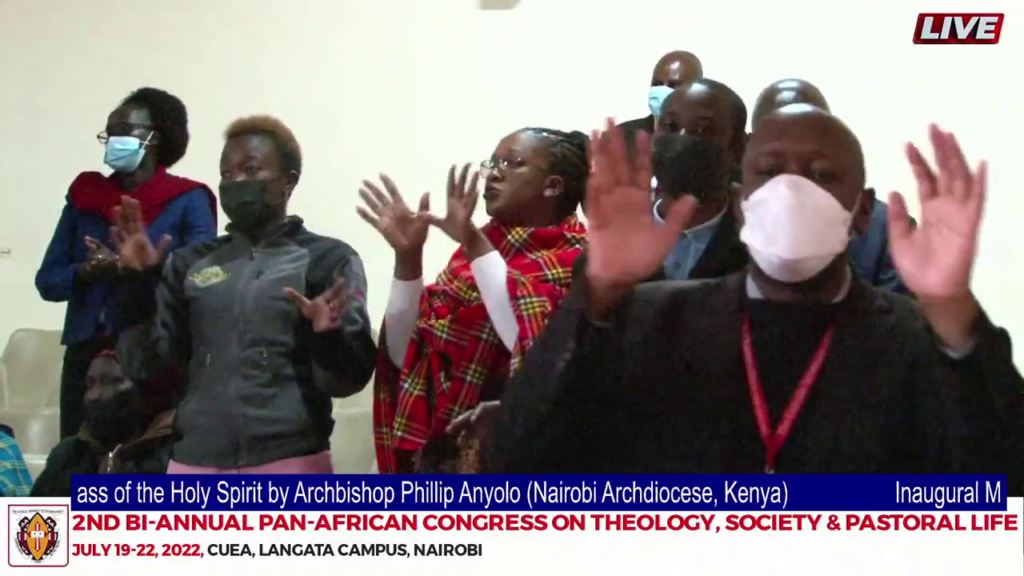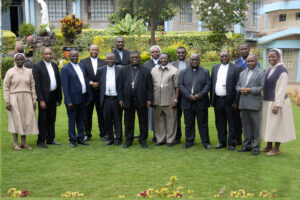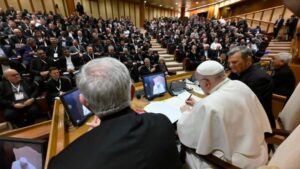KENYA: Pan-African Congress on Theology Resolves to Collaboratively Build a Vital Church

Sr. Jecinter Antoinette Okoth, FSSA
At the end of the second Biannual Pan-African Catholic Congress on Theology, Society and Pastoral Life, participants have agreed to build a vital Church in Africa through collaboration to make the continent a home for all Africans.
In a statement shared with AMECEA online Wednesday, July 27, days after closure of the congress, the participants who gathered at the Catholic University of Eastern Africa (CUEA) in Nairobi stressed that after reflecting on the themes of synodality; concerns, aspirations, hopes, achievements of African women and children, they “have considered the ways of being a vital church relevant to the context of Africa.”
“As members of the Family of God in Africa, we pray and resolve to work together towards building a synodal and vital Church in Africa. We pray that God through his Son will lead us to see the surprises of the Holy Spirit in our uniqueness and diversity,” reads part of the statement as it continues, “We commit to developing networks of collaboration between churches in Africa and beyond, to enhance prophetic Christian witness in the world.”
According to members of the Pan-African Catholic Theology and Pastoral Network (PACTPAN), their vision is to bridge the gap between pastoral practice and multi-disciplinary scholarly work on the African continent by collaboratively listening to God and to His people, in order to inspire hope and transformational faith and promote best practices for the betterment of the Church and society. Therefore, PACTAN members commit themselves to “listen, dialogue, and collaborate with other churches, faith communities, civil authorities, and social actors to promote a sustainable way of life in the continent and world.”
The African theologians further commit “to advancing a healthy dialogue between churches, religions, and African spiritual traditions for the purpose of mutual growth and peace,” in order to promote a vital Church in the continent.
Sharing their findings and resolutions after the four-day congress from July 19-22, the leadership of the African Catholicism Project appreciated “the extraordinary ability of African women to embody resilience, perseverance, the ability to overcome hardship, and to bounce back from traumas and adversities.”
They acknowledged that African women are normally “forced to bear the burden of life’s trials and afflictions as they struggle to overcome obstacles to human flourishing and abundant life,” stressing that the African women’s resilience is where hope must find its expression as an affirmation of life, even in the face of death.” Hence the task of the Family of God “is to show solidarity in building a better society where African women will always flourish.”
Concerning the thematic area on African children, the congress noted that the continent cherishes the gift of life as “it defines not only the continuity of our societies but also an expression of a life beyond the reality of death” which calls for life to be sustained, nurtured, and protected.
Unfortunately, their message reads, the life of children who are the present and future of the society “has long been mortgaged by conflicts, corruption, and all forms of abuses, and recently, by unguarded adhesion to unethical globalization.”
“The Congress calls attention to the need for the Church in Africa to embrace policies that are intended to protect the children henceforth from all forms of abuses in families, churches, and society. This includes child sexual abuse, modern-day slavery, and human trafficking playing out both in the continent of Africa and beyond,” they underscored.
Reflecting on the aspect of synodality during the congress whose theme was “Walking Together for a Vital Church for Africa and the World,” members of PACTPAN highlighted that there are “many positive initiatives playing out in our ecclesial communities, and social contexts.”
However, citing the “plague of clericalism” existing in some ecclesial communities as a major obstacle to walking together as a family of God, they emphasized in their Wednesday statement: “We have also noticed how much we still have to traverse in order to reach that place of flourishing for all persons who call Africa their home.”
“It (plague of clericalism) works against inclusion of all persons in the mission of the Church hence, the “urgent and complex social problems that afflict us show how important it is that the synodal spirit –“walking together”–becomes a source of inspiration for ethical, ecclesial, and political commitments.”
In conclusion the congress called for a Gospel-driven servant leadership in the churches that “overcomes clericalism and samaritanizes the wounded, the broken and those at the existential peripheries.”


